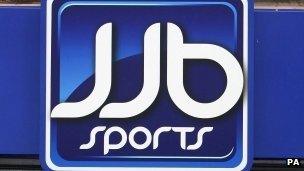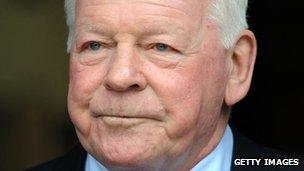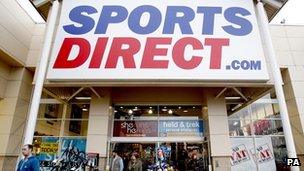What went wrong at JJB Sports?
- Published

JJB Sports has had a difficult time since 2008
As an example of what can go wrong at a previously successful retail business JJB Sports has few rivals.
In five years it has gone from one of the UK's largest sellers of sportswear, to a company that has now fallen into administration following mounting losses and high debt levels.
A well-known brand on High Streets across the country, the combined value of JJB Sports' shares totalled £500m as recently as 2010. Ahead of its shares being suspended on Monday it was worth just £1.2m.
Add criminal charges against one of its former bosses, and - completely unconnected - investment in the business by the richest man in America, and you have quite a tale.
Founded in Wigan, Lancashire, in 1971 by former professional footballer Dave Whelan, the business started with just one shop.
Mr Whelan quickly proved his retail acumen, and the company steadily grew, eventually reaching a peak of 430 stores across the UK and Republic of Ireland in 2005, and becoming a profitable household name.
If Mr Whelan had remained at the helm, perhaps history would have been different, but he sold up in June 2007 to concentrate on running Wigan Athletic Football Club.
His 29% stake was bought for £190m by Chris Ronnie, who had previously worked for rival store chain Sports Direct, backed by Icelandic financial group Exista.
Debt woes
With Mr Ronnie as the new chief executive, JJB quickly went on the acquisitions trail, buying both footwear firm Original Shoe Company, and a minority stake in sportswear brand Umbro, before the end of 2007.
In a buoyant financial market, the buyout of JJB and the company's subsequent acquisition deals could have been successful.
But with the UK and rest of the world plunging into the global financial crisis in the second half of 2008, JJB quickly found itself in financial difficulties.

JJB Sports never recovered when Dave Whelan left in 2007
With its sales now trailing way behind rivals Sports Direct and JD Sports in a toughened retail environment, JJB found that it was having difficulty servicing its expensive debt as profits plunged.
Sell-offs soon followed, as JJB trimmed back its store portfolio to more than half its peak, and sold its fitness clubs back to Mr Whelan.
Meanwhile, Original Shoe Company and another underperforming subsidiary, footwear brand Qube, were put into administration.
Growing losses
Mr Ronnie left the company in 2009, but subsequent bosses have failed to stop the rot.
Since then JJB has had to twice restructure its debts, and persuade its shareholders - which include the Bill and Melinda Gates Foundation, the charity set up by the founder of US software giant Microsoft - to invest more than £200m.
But with losses continuing to mount - they totalled £100m in 2011 - JJB has continued to struggle.
A final roll of the dice came in April of this year, when US retailer Dick's Sporting Goods decided to invest £20m in the business.
Yet just three months later Dick's announced that it had written off the investment, saying JJB's sales had "materially deteriorated from its expectations".
And so in August, JJB said it was putting itself up for sale in the face of debts of £36m.
Meanwhile, former JJB boss Chris Ronnie was earlier this year charged with three counts of fraud, two money-laundering offences and two counts of furnishing false information relating to his time at the company.
He denies the charges and the case has yet to go to court.
Matt Piner, lead consultant at retail research group Conlumino, said everything started to go wrong at JJB as soon as Dave Whelan departed.
"When Mr Whelan left JJB lost its vision, core values and drive. And it went spectacularly wrong," he said.
Despite JJB struggling with debts going back to the 2007 buyout, Mr Piner said its core problem was a lack of retail focus.
"JJB's main issue is that it never really found a proper point of difference," he said.
"If you look at its two main rivals, Sports Direct is very much focused on offering the best possible value for money. While JD Sports is at the fashion end of the sportswear market. Both are very focused.
"By contrast, JJB doesn't fit in with either of those. It didn't have a coherent offering, so there was no reason for customers to want to go there - it was more expensive than Sports Direct and did not have as fashionable an offering as JD Sports."
'Lacklustre management'
From Mr Whelan's point of view, he has publicly blamed the various bosses who have led JJB since he left the company.

Potential customers have instead gone to rivals such as Sports Direct
Bryan Roberts, retail insight director at Kantar Retail, agrees with him.
Mr Roberts said: "Since Mr Whelan departed, the company has been run into the ground by lacklustre management teams.
"It has been out muscled by Sports Direct, and has had to borrow money from its shareholders just to stay afloat."
And now, after administrators were appointed at JJB, Sports Direct has acquired 20 of its stores, the brand and the website.
The remaining stores will be closed, leading to about 2,200 workers losing their jobs.
- Published30 August 2012
- Published15 August 2012
- Published9 July 2012
- Published5 April 2012
- Published4 April 2012